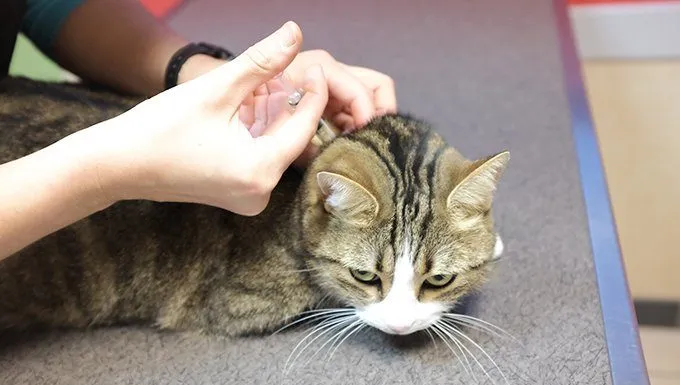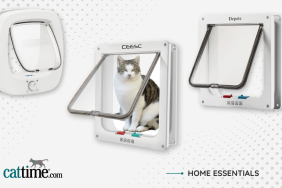Prednisone for cats can treat a variety of illnesses and conditions. Prednisone and prednisolone are steroids used to reduce inflammation, treat some types of cancer, suppress the immune system, and act as an artificial replacement for glucocorticoid when the cat’s body is not making enough on its own.
The drug works by acting in the same way as cortisol, a naturally occurring hormone produced by cats’ adrenal glands. Prednisone has amazing anti-inflammatory properties, which makes it an ideal course of treatment for certain cat ailments.
It comes in many forms, like syrups, liquids, and tablets, and it can be administered orally or as an injection. You must ask your vet and follow their instructions for dosage before giving these drugs to your cat.
Prednisone and prednisolone are much more potent that the cortisol your cat’s body produces naturally, so there are potential side effects that come with using this medication. Here’s what you should know.
Uses Of Prednisone In Cats
Your veterinarian may recommend prednisone or prednisolone for your cat on a short-term basis for certain ailments, especially as an anti-inflammatory.
The primary uses of the drug in cats include:
- Reducing swelling caused by allergies, from skin irritation to anaphylactic shock caused by insect stings
- Feline asthma
- To reduce internal swelling, such as in the case of an upper respiratory infection
- Pancreatitis
- Irritable Bowel Syndrome (IBS)
- Kidney related disorders
- Endocrine disorders
- Autoimmune conditions
Prednisone Doses For Cats

The following is a guideline for typical use of the drug in cats. It must not replace your veterinarian’s advice for your individual pet.
Veterinarians can administer prednisone orally or through injection. How much they should administer depends on the cat’s condition and how the cat responds to the steroid.
For example, a cat who receives treatment for an autoimmune condition may require up to 3 mg of prednisone per pound of the cat’s weight per day. Typically, however, it is administered at 1 mg per pound.
Cats should generally not be on a long-term treatment with prednisone, as it can have dangerous side effects in the long run.
If your cat suffers form inflammation of the liver, whether from cancer or other reasons, it’s not recommended that they are given prednisone. Your cat’s liver converts prednisone into prednisolone, and a cat with a strained liver will have limited conversion abilities.
For cats suffering from liver issues, prednisolone is the recommended steroid, but still in small and monitored doses.
Side Effects Of Prednisone And Prednisolone In Cats
If your cat is prescribed prednisone or prednisolone, you should know that there are potential side effects, both long and short term.
Here are some of the potential side effects of short-term Prednisone or Prednisolone use in cats:
- Increased thirst (Polydipsia)
- Renal disorders and excessive urination (due to Polydipsia)
- Increase in appetite (Polyphagia)
- Weight gain and fluid retention
- Fur/Hair Loss
- Behavioral differences, such as an increase in anxiety, paranoia, or depression in your cat
- Panting
Here are a few of the side effects you might see in cats with long-term use of Prednisone or Prednisolone:
- Inhibited growth in young pets, which is why prednisone is not recommended to pregnant cats or kittens
- Diabetes
- Cushing’s disease
- Vomiting & diarrhea
- Increased risk of infection, both bacterial and fungal
- Digestive tract ulcerations
- Lethargy
- Urinary Tract Infections (UTI)
- Wounds healing slowly
- Poor or thin coat
If any of these side effects become concerning during treatment with prednisone, contact your vet immediately. Your vet may then recommend altering the dosage or seeking a new form of treatment.
Just like any other medication, prednisolone or prednisone could result in a severe allergic reaction known as anaphylaxis. Call your vet immediately if you see signs of an allergic reaction in your cat, such as itching, hives, trouble breathing, or swelling.
Has your cat ever been on prednisone before? Was it effective? Did your cat experience any side effects? Let us know in the comments.









